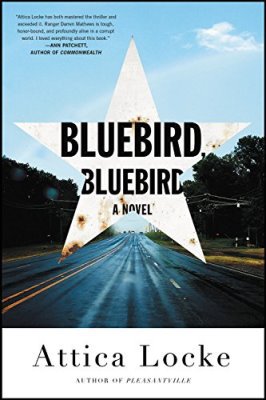 Attica Locke is a former script writer for the Fox TV show Empire. I mention this because such experience attests to the crisply written scenes and sharply crafted chapter endings in her newest crime novel, Bluebird Bluebird, the first book in a proposed trilogy. The narrative drama vividly jumps off the page. According to Deadline Hollywood, cable station FX has picked up this atmospheric story to develop it into a TV crime series called “Highway 59.”
Attica Locke is a former script writer for the Fox TV show Empire. I mention this because such experience attests to the crisply written scenes and sharply crafted chapter endings in her newest crime novel, Bluebird Bluebird, the first book in a proposed trilogy. The narrative drama vividly jumps off the page. According to Deadline Hollywood, cable station FX has picked up this atmospheric story to develop it into a TV crime series called “Highway 59.”
The lead investigator in Bluebird Bluebird is Darren Matthews, a flawed, black Texas Ranger who walked away from a University of Chicago law degree to fight for justice in his homeland of East Texas. Like most lead investigators in a crime novel, he’s got personal troubles. He drinks too much, and his wife is upset over his career choice. To further complicate his life, Matthews is on suspension for having stepped over the ethical line in a race-related murder case.
Attica Locke doesn’t settle here for her crime. She cleverly turns our attention to another murder – specifically, a double murder in rural East Texas, along a stretch of U.S. Highway 59. A 35-year-old black Chicago lawyer, Michael Wright, is pulled from the bayou near the town of Lark. A week later, a 20-year-old local white girl, Missy Dale, is found dead, also in the bayou. The murders present a reversal in the small-town South, populated by white supremacists, where a dead white girl would be expected to be found first, and then a dead black man.
The off-pattern sequence of the two murders alerts Matthews’ suspicion. He also quickly finds himself in a volatile environment wrapped tightly in lies and loyalty. The black patrons of Geneva Sweets’ café on one side of Highway 59 and the white supremacists of Jeff’s Juice House on the other side clearly know more about Missy and Michael than they are sharing, especially about the one night the two were seen together at the Juice House.
In tense, cinematic scenes, Matthews doggedly pursues answers by challenging the local sheriff and putting himself in danger with the supremacists. He manages to survive a couple shoot-outs. He also manages to contain Michael Wright’s high-maintenance widow, who arrives in Lark and stays beside Darren wherever he goes. Her presence contributes to the plot development, but it’s ill-fitting to a criminal investigation and doesn’t ring true. That’s a minor complaint, though, as Locke’s combined insight and vivid narrative style develop an intriguing story and bring issues of racism and injustice to light with unsettling precision.
Matthews’ astute instincts lead to a satisfying conclusion that explains why Michael Wright traveled so far from his Chicago home to East Texas. The ending also reveals deep secrets from Lark’s past and the people who still live there. On the book’s last page, Locke drops a huge surprise that throws a big question mark over the future of our Texas Ranger. It leaves us to wonder what’s going to happen next to this intuitive, very likeable lawman.
A version of this review was broadcast on central Ohio’s NPR member station WOSU 89.7 FM. The blog post title comes from lyrics in the theme song of the 1990’s CBS TV show Walker, Texas Ranger.
Share this:





